捷进英语 Unit 6
Unit6-电子教案

(捷进英语2)U n i t6-电子教案(共5页)--本页仅作为文档封面,使用时请直接删除即可----内页可以根据需求调整合适字体及大小--教案课程名称捷进英语综合教程2课时班级专业教师系部教研室教材《捷进英语综合教程2 教师用书》Sense and memoryImproving your memoryPerfect memories?Reading for learningSense and memoryReading for DoingDon’t Forget!Guided WritingA QuestionnaireAudio/Video LabIf you have time before the lesson youcould prepare your own timeline to displayto the class.This section startswith identifyingexamples andusing them tohelp the studentunderstand thetext. It alsoencouragesstudents toproduce a briefsummary of thetext.Vocabulary andGrammarThe first two tasks work on the meaning of thematic words from the text. Task 3 looks at various fixed phrases from the text. The grammar section looks at the passive voice in the present and past simple.The first two tasks encourage students to form an understanding of examples. When doing Task 4, if you have a strong class you could simply write the three headings on the board and ask students to write their own summary sentences.The first vocabulary tasks draw on topic vocabulary from the text.The second vocabulary task can be easily extended by asking students to give written or spoken answers to each question.The Grammar Focus part looks at the passive voice in the present and past simple. Task 2 contains factually true sentences. You could extend this by asking students to write their own general knowledge quiz in the passive voice. The topic in Task 3 can also be extended into a discussion task.Beyond the text This section also recycles the passive in a fun way by creating realBeyond the Text Students look at two puzzles and write their own puzzle.Ss read an article giving advice on improving your memory.This section should take less time than section B as the texts are less complicated. They focus on developing students’ everyday reading skills.If you have more time, you could develop the final task on revision planning and strategies further.Students write, ask and answer a questionnaire.Before the lesson you could find examples of questionnaires online.When doing Task 5 you might need to provide some model questions for more support.For each part of the video you might want to play it twice.Tasks 3 provides a good opportunity for using visuals to help you understand a lecture.This section provides a quick review of the vocabulary, grammar, writing and theme of the unit.Tasks could be set for individual work or done in pairs. For the first tasks on the language work you might want to set them up as a team game or class quiz.For the final tasks these could be set as small group discussion or down as a reflective writing task.Finish all the tasks in Unit 6.Read the two texts in this unit again and try to summarise their contents.Prepare a PPT presentation on your survey result in Task 3 of the warp-up section.。
Unit6-电子教案
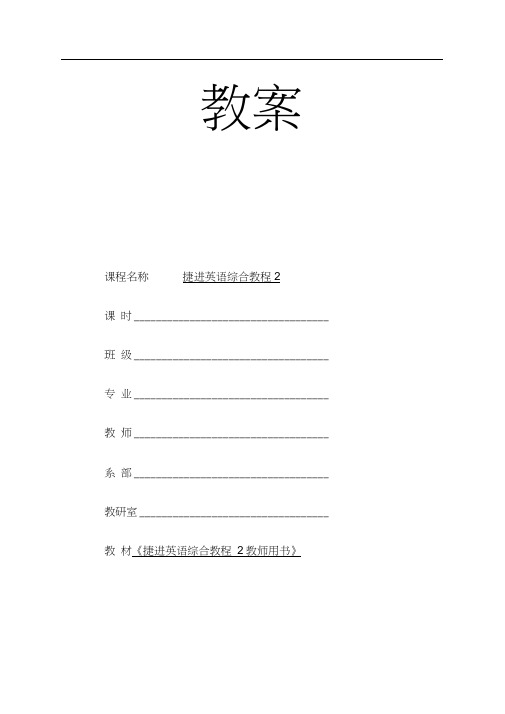
write the three headings on
the stude nt
the board and ask students
for
un dersta nd
to write their own summary
lear ning
the text. It
senten ces.
also
The first vocabulary tasks
教案
课程名称捷进英语综合教程2
课 时பைடு நூலகம்
班 级
专 业
教 师
系 部
教研室
教 材《捷进英语综合教程2教师用书》
Teach ing Plan
教学
单元
Un it6In My Mi nd
单元
主题
Sense and memory
Impro ving your memory
Perfect memories
课
时安
排
8
教 学 内 容
tasks work on
in the prese nt and past
the meaning of
simple. Task 2 contains
thematic words
捷进英语2unit6课后答案
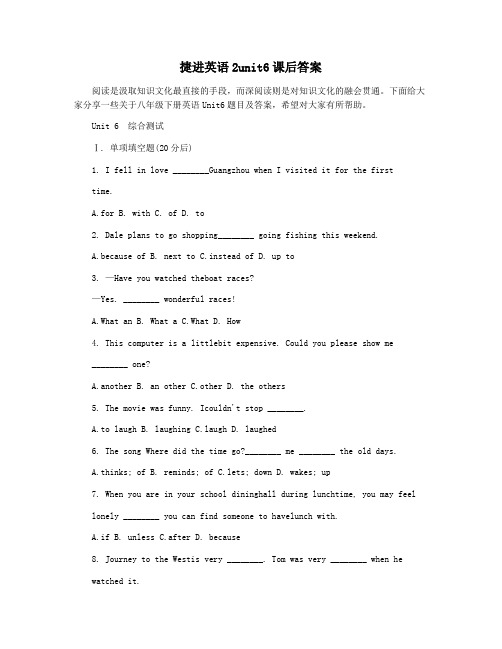
捷进英语2unit6课后答案阅读是汲取知识文化最直接的手段,而深阅读则是对知识文化的融会贯通。
下面给大家分享一些关于八年级下册英语Unit6题目及答案,希望对大家有所帮助。
Unit 6 综合测试Ⅰ. 单项填空题(20分后)1. I fell in love ________Guangzhou when I visited it for the firsttime.A.forB. withC. ofD. to2. Dale plans to go shopping________ going fishing this weekend.A.because ofB. next toC.instead ofD. up to3. —Have you watched theboat races?—Yes. ________ wonderful races!A.What anB. What aC.WhatD. How4. This computer is a littlebit expensive. Could you please show me________ one?A.anotherB. an otherC.otherD. the others5. The movie was funny. Icouldn't stop ________.A.to laughB. laughingughD. laughed6. The song Where did the time go?________ me ________ the old days.A.thinks; ofB. reminds; ofC.lets; downD. wakes; up7. When you are in your school dininghall during lunchtime, you may feellonely ________ you can find someone to havelunch with.A.ifB. unlessC.afterD. because8. Journey to the Westis very ________. Tom was very ________ when hewatched it.A.excited; excitingB.exciting; excitedC.exciting; excitingD.excited; excited9. —What's your opinion onfriends?—They are like books. We don't needa lot of them ________ they're good.A.as long asB. as soon asC.so thatD. as if10. —Mom, I want to driveto my grandparents' home.—Don't be ________. You are too youngto drive.A.sillyB. noisyC.nervousD. sadⅡ. 完形填空(20分)Why do children like cartoons so much?Maybe that's because in cartoons,there are many__11__. They always helppeople in trouble and keep fighting badpeople. Of course, heroes __12__badpeople in the end. So almost every cartoonhas a happy ending.I have been the Monkey King's fan __13__I was a child. At that time, my favorite cartoon heroes were the Monkey King, Captain(警长) Black Cat,Calabash(葫芦) Brothers, Ma Liang…__14__ of them comefromChina!Buttoday's kidsare very different __15__ me. Most of their favorite cartoonheroes are fromforeign countries, especially__16__. Batman(蝙蝠侠) and Spiderman are two ofthem.Batman and Spiderman are not only veryfamous but also very__17__. Batman isolder than Spiderman. The first Batmancartoon appeared__18__.And since ,Batman has been one of the fewcartoon heroes to appear in books continuously(已连续地,不间断地).Spiderman is __19__ years younger than Batman. He first appeared in.In, he appeared in daily__20__. People can see the Spiderman cartooninover 500 different newspapers around the world.11. A. policemen B. heroes C.children D. animals12. A. beat B. win C. hurt D. hit13. A. when B. for C. since D. until14. A. None B. One C. Both D. All15. A. for B. of C. to D. from16. A. China B. Japan C.America D. England17. A. old B. young C. long D. short18. A. at B. on C. in D. to19. A. 53 B. 43 C. 33 D. 2320. A. newspapers B. books C.magazines D. newsⅢ.阅读理解(20分)TheMagic MedicineThere once lived inChinaavery foolish king and queen. One day, the queenhad a baby daughter. When they sawtheir baby, they both cried out, “My goodness!How small it is! It's hairlessand toothless! It's a monster(怪物)!” They sent forall the doctors in thecountry and ordered them to prepare some medicine forher.“When she drinks your medicine, she mustgrow to the right size and havehair and teeth,” the king said. “Ifyou don't do this, you'll be beaten.” The doctors thought it impossible, butthey dared not say anything againstthe king's order. Just then an old doctor steppedforward. “Oh,we shall certainlyobey your order,”he said, “but it takes time. We haveto dig for a mineral(矿物)from the Kunlun Mountainswhen the snow melts(融化) for the second time. Thesnowmelts on those mountains only once in six years. So we need twelve years.” At last the king agreed and the doctorstook away the little princess. Onher twelfth birthday, they brought her back toher parents with long black hairand beautiful teeth. The king and the queen werevery happy and gave the doctorsexpensive presents.21. Which of the followingwords makes the sentence untrue? The baby was________.A.toothlessB. hairlessC.unusualD. small22. The doctors would bebeaten if ________.A.the baby daughterdidn't take their medicineB. theyrefused to obey theking's orderC.the baby daughtergrew to the right sizeD. thebaby daughter became amonster23. The old doctor wantedto keep the king's daughter for twelve yearsbecause ________.A.they neededa lot of different plantsB.they neededa lot of different mineralsC.this would givethe baby time to grow upD.they had todig for a mineral when the snow melted for the second time24. The doctors thought itimpossible ________.A.for them tochange the king's orderB.for them toprepare the medicine in twelve yearsC.for the smallbaby to take the medicineD.for them tomake the baby have teeth and hair and grow up at once25. ________, the king wouldn'thave given them expensive presents.A.If the doctorsbrought back a beautiful girlB.If the doctorshadn't found the mineralsC.If the doctorswere able to prepare the magic medicineD.If the daughterwere still a monster twelve years laterⅣ. 从方框中选出合适的单词或短语,并用其适当形式完成短文(20分)silly, kill, at last, knife, live, rich, excite, used to, thinkof, cryLong time ago, there was a man 26.____________in a village with his wifeand two children. They had a hen. It laid(下蛋) a golden egg every day. The mansoldthe golden egg and the family lived a 27.____________ and comfortable life.But the man was very greedy(自私的). He wanted to get all the golden eggsfromhis hen at a time. So, he thought hard every day about how to achieve it andhegot a plan 28.____________. He decided 29.____________ the hen and got alltheeggs. He didn't wanted to tell his wife about the plan because he wanted togiveher a big surprise. He was so 30.____________ about his great plan. He evenstartedto sing when he 31.____________ the plan.The next day when the hen laid a goldenegg, the man couldn't wait to take a32.____________ and cut its body open. However,there was nothing but blood allaround. There weren't any eggs at all. He was verysad because he couldn't geteven one egg now. He couldn't stop 33.____________.Their life 34.____________ be comfortablewith one golden egg a day, but nowtheir life changed a lot.How 35.____________ he was!Ⅴ.书面抒发(20分后)仔细观察下列四幅图画,展开合理想象,写一篇短文。
(捷进英语1)Unit6-电子教案
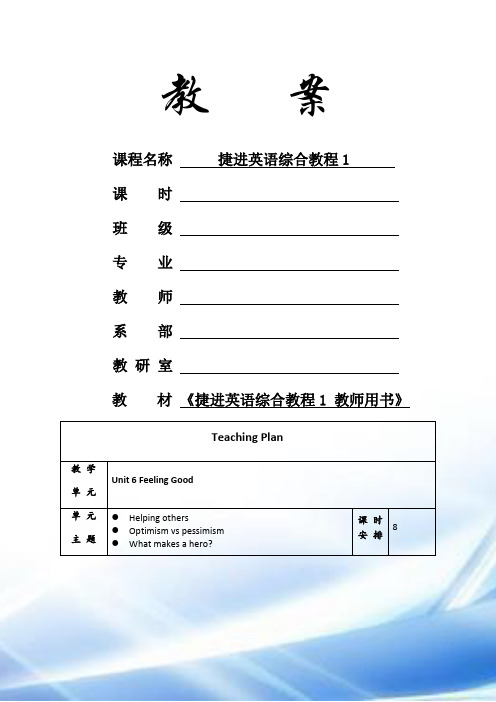
教案课程名称捷进英语综合教程1课时班级专业教师系部教研室教材《捷进英语综合教程1 教师用书》Teaching Plan教学单元Unit 6 Feeling Good单元主题●Helping others●Optimism vs pessimism●What makes a hero?课时安排8教学内容●Reading for learningWould You Like to Make a Difference?●Reading for DoingHalf Full or Half Empty?●Guided WritingA Letter of Thanks●Audio/Video Lab教学环节主要特色教学活动安排建议Warm-up(热身)This section introducesthe idea of feelings andreactions. It does thisthrough a set ofadjectives and musicclips for students toreact to.✧Depending on the time you have available,you could extend this into students playingtheir own music and discussing how themusic makes them feel.Reading (阅读)Readingforlearning◆This section startswith usingpronoun referentswhen reading tohelp understandthe organisation ofa text. It thenencouragesstudents to workout reasons in thetext.◆Vocabulary andGrammarStudents look atphrases and individualwords from the text.The grammar focus✧In Task 4 of Reading and Understanding,you could ask students to compare theirtranslations with a partner. Then ask studentsto close their books and translate them backinto English.✧In Vocabulary Focus, the three vocabularytasks draw on the text. Task 1 and Task 3 arealso a set of questions and so work well aspair-work discussion tasks.✧The Grammar Focus part looks at differentways of referring to the past, present andfuture with quite simple structures. Afterworking through the tasks you would setstudents a short written or spoken task usingthese structures to refer to their own desiresin the past present and future.✧Beyond the Text encourages students to reactlooks at would like to, like to and wanted to.◆Beyond the TextStudents interpret their own decisions. personally to the texts they have read. It also practices the grammar structure. Students could also think about and discuss their own good deeds.Reading for doing ◆Students read andanswer aquestionnaire onoptimism andpessimism.✧This section should take less time thansection A as the text is less complicated.They focus on developing students’ everydayreading skills as they are reading andresponding to a questionnaire.✧If time permits, students could create theirown scenario and options for others tochoose as an additional question in thequestionnaire.Guided Writing ◆Writing a letter ofthanks:(1) Formal expressionsof thanks(2) Informalexpressions ofthanks ✧When checking Task, 2 you could highlightsome of the other features of informality aswell as the vocabulary / phrases focused on,e.g. the punctuation and contractions.✧With weaker students you might want toshow them the model first before they writetheir email.Audio/Video Lab ◆Students watch avideo showingan interviewwith someonewho has donesomethingheroic:(1) making predictions(2) dictating andansweringquestions ✧Write hero onto the board and ask students todefine the word and to think of an example of one.✧When you get to Task 5, you will probablyneed to pause briefly between each question.Wrap-up ◆This sectionprovides a quickreview of thevocabulary,grammar, writing ✧For Task 1, Task 2 and Task 3 on thelanguage work, you might want to set themup as a team game or class quiz.✧For Task 4, it could be set as small groupand theme of theunit.◆Tasks could be setfor individualwork or done inpairs.discussion task.课后学习设计作业◆Finish all the exercises in Unit 6.◆Read the two texts in this unit again and try to summarisetheir contents.◆Write a letter of thanks to a person who ever helped you.课后总结和反思。
捷进英语 Unit 6
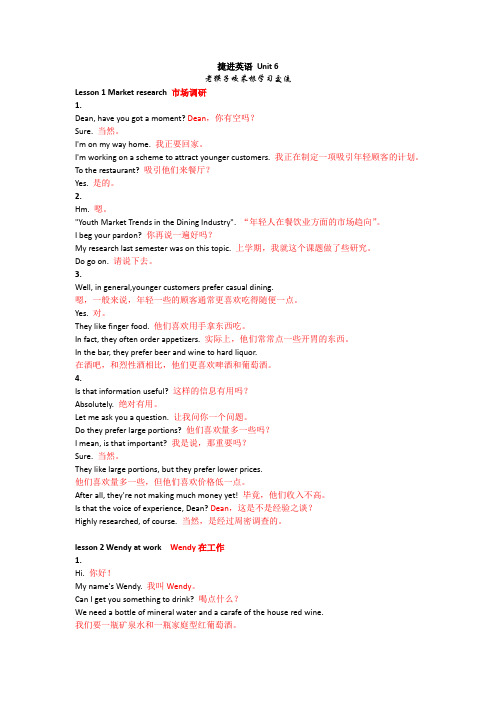
捷进英语Unit 6老猴子咬菜根学习交流Lesson 1 Market research 市场调研1.Dean, have you got a moment? Dean,你有空吗?Sure. 当然。
I'm on my way home. 我正要回家。
I'm working on a scheme to attract younger customers. 我正在制定一项吸引年轻顾客的计划。
To the restaurant?吸引他们来餐厅?Yes. 是的。
2.Hm. 嗯。
"Youth Market Trends in the Dining Industry". “年轻人在餐饮业方面的市场趋向”。
I beg your pardon? 你再说一遍好吗?My research last semester was on this topic. 上学期,我就这个课题做了些研究。
Do go on. 请说下去。
3.Well, in general,younger customers prefer casual dining.嗯,一般来说,年轻一些的顾客通常更喜欢吃得随便一点。
Yes.对。
They like finger food. 他们喜欢用手拿东西吃。
In fact, they often order appetizers. 实际上,他们常常点一些开胃的东西。
In the bar, they prefer beer and wine to hard liquor.在酒吧,和烈性酒相比,他们更喜欢啤酒和葡萄酒。
4.Is that information useful? 这样的信息有用吗?Absolutely. 绝对有用。
Let me ask you a question. 让我问你一个问题。
Do they prefer large portions? 他们喜欢量多一些吗?I mean, is that important? 我是说,那重要吗?Sure. 当然。
英语九年级上册unit6知识点
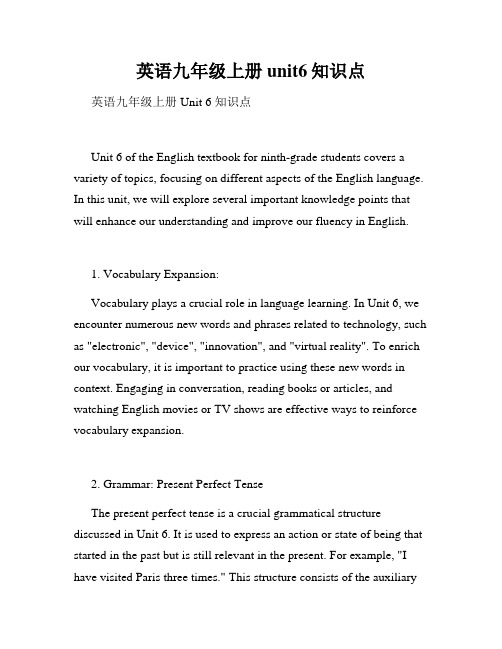
英语九年级上册unit6知识点英语九年级上册 Unit 6 知识点Unit 6 of the English textbook for ninth-grade students covers a variety of topics, focusing on different aspects of the English language. In this unit, we will explore several important knowledge points that will enhance our understanding and improve our fluency in English.1. Vocabulary Expansion:Vocabulary plays a crucial role in language learning. In Unit 6, we encounter numerous new words and phrases related to technology, such as "electronic", "device", "innovation", and "virtual reality". To enrich our vocabulary, it is important to practice using these new words in context. Engaging in conversation, reading books or articles, and watching English movies or TV shows are effective ways to reinforce vocabulary expansion.2. Grammar: Present Perfect TenseThe present perfect tense is a crucial grammatical structure discussed in Unit 6. It is used to express an action or state of being that started in the past but is still relevant in the present. For example, "I have visited Paris three times." This structure consists of the auxiliaryverb "have" or "has" followed by the past participle form of the main verb. Gaining proficiency in using the present perfect tense requires practice in various contexts, such as talking about personal experiences, discussing achievements, or describing recent events.3. Reading Comprehension Strategies:Unit 6 provides us with a range of reading materials, including news articles, interviews, and short stories. To enhance our reading comprehension, we can employ several strategies. Skimming the text to get an overview, scanning for specific information, and identifying the main idea and supporting details are effective strategies in comprehending English texts. Additionally, highlighting and making notes about important information can aid in understanding and retention.4. Listening Skills:Developing strong listening skills is essential for effective communication in English. Unit 6 presents various listening tasks, such as interviews, presentations, and dialogues. To improve our listening abilities, we can practice listening to English podcasts, watching English videos, or engaging in conversations with native English speakers. Additionally, focusing on key words and phrases, payingattention to intonation and stress, and practicing active listening can enhance our overall listening comprehension.5. Speaking Practice:Unit 6 provides opportunities for us to practice speaking English through group discussions, role plays, and presentations. Engaging in these activities enables us to express our opinions, practice using new vocabulary and grammar structures, and develop our fluency. To further improve our speaking skills, it is beneficial to engage in conversations with English-speaking individuals or join language exchange programs where we can interact with native speakers.6. Writing Skills:The unit also emphasizes writing skills, encouraging students to express their thoughts and ideas through various writing tasks, such as emails, formal letters, and essays. To enhance our writing abilities, we should focus on organizing our ideas coherently, using appropriate vocabulary and grammar, and editing and revising our work for clarity and accuracy. Practicing writing regularly, seeking feedback from teachers or peers, and reading well-written English texts will contribute to our growth as writers.In conclusion, Unit 6 of the English ninth-grade textbook comprises a diverse range of knowledge points aimed at improving our English language proficiency. From expanding our vocabulary and understanding grammar structures to enhancing reading, listening, speaking, and writing skills, these knowledge points provide valuable insights and strategies for language acquisition. By actively engaging in practice, seeking opportunities for exposure, and persistently working on these skills, we can strengthen our overall English proficiency and fluency.。
2024-2025学年人教版九年级英语上学期 Unit 6【速记清单】
Unit 6 When was it invented?考点1 .…was invented …“某物被发明……”【教材原句】When was it invented?它是什么时候发明的【句型剖析】…was invented …句意为“某物被发明……”,是被动句式。
例如:The abacus was invented in the sixteenth century by the Chinese.算盘在十六世纪由中国人发明的。
Who was the light bulb invented by?灯泡是由谁发明的?【拓展】被动语态的结构是:主语+be done(及物动词的过去分词),be是随人称和时态变化而变化的。
(1)一般现在时的被动语态:am/ is/ are done 例如:The blackboard is cleaned by the students every class.黑板每节课都被学生擦干净。
(2)一般过去时的被动语态:was/ were done 例如:The computer was invented last century.电脑是上个世纪被发明的。
(3)一般将来时的被动语态:shall/will be done 例如:A new school will be built in our village next year.明年一所新的学校将在我们村庄建设。
(4)现在进行时的被动语态:am/is/are being done 例如:A sports meeting is being held in our school now.运动会正在我们学校举行。
(5)现在完成时的被动语态:have/has been done 例如:All of the work has been finished since I came here.自从我来这里以来,所有的工作都已经完成。
(6)含有情态动词的被动语态:can/may/must/should be done 例如:Your homework must be handed in after school.你们的家庭作业必须在放学后交上。
U6捷进英语B2 课文讲解Reading for Learning
捷进英语2 Unit 6 Reading for Learning课文讲解
• Knowing what you value most最看重什么is only the first step. Sometimes in reality现实生活, we cannot find a job that satisfies all our needs满 足我们所有需求or is perfect in every way每一方 面都很完美的. If we have too much of one thing 某一方面满意度很高and not enough of another另 一方面的诉求却远不能满足, we are unlikely to be satisfied. Finding a balance between the factors 在各种因素中找到平衡and deciding what to give up is even more important.
5How important are your passions and interests爱好和兴趣? 6Could you make money from your passions?
• Using Your Talents发挥你的天赋
• Find发现 your talents first. 7What are your talents? What are the skills behind the talents天赋背后的技能?
• Making a Difference缔造不同 • This is a common desire普遍愿望in job-seekers
求职者. 4What is your definition of如何定义 “making a difference” “缔造不同”? Too many people think making a difference缔造不同is about protecting people or animals. Actually, you can also make a difference when you comd accurately迅速而准确地.
《 捷进英语综合教程2(新智慧版)》教学课件unit6
READING FOR LEARNING
Using questions wisely(合理运用问题) 在某些文章中,作者会提出一些问题请读者思 考,然后再作进一步解释。所以,阅读这类文 章的时候,你可以先试着简单写下你对这些问 题的初步想法,为后面的答题作准备或铺垫。 例如,读到How much income do you want? 你就 可以先试着写下自己的答案,如Enough to live on或The more, the better等。把这些答案记下来, 可能会对后面的答题有所帮助。
that talent might be things such as logic and 力等技能。(那么,) 有哪些事
mathematical ability. 8What careers are
业是与这些技能相关的呢?
connected to these skills?
I Don’t Know What to Do!
追随你的爱好 人们往往认为这一点太不现 实。它容易使人联想到那些想成 为歌手、演员或足球运动员的人 。然而,生活中有很多我们感兴 趣的事,而且越来越多的人正开
people are thinking about how they can
始考虑如何通过从事喜欢的事挣
make enough money from something they enjoy. 5How important are your passions
足够多的钱。你的爱好和兴趣( 对你)有多重要?你能靠它们挣
ห้องสมุดไป่ตู้
and interests? 6Could you make money
钱吗?
from your passions?
捷进英语2教材unit6翻译句子
捷进英语2教材unit6翻译句子1. Do you have a family?你有孩子吗?2. It’s a good father that knows his son.就算是最好的父亲,也未必了解自己的儿子。
3. I have no opinion of that sort of man.我对这类人很反感。
4. She put 5 dollars into my hand,“you have been a great man today.她把5美元塞到我手上说:“你今天表现得很好。
”5. I was the youngest son, and the youngest but two.我是最小的儿子,但是我还有两个妹妹。
6. The picture flattered her.她比较上照。
7. The country not agreeing with her, she returned to England.她在那个国家水土不服,所以回到了英国。
8. He is a walking skeleton.他很瘦。
9. The machine is in repair.机器已经修好了。
10. He allowed the father to be overruled by the judge, and declared his own son guilty.他让法官的职责战胜了父子的亲情,最终宣布儿子有罪。
11. You don’t know what you are talking about.你在胡说八道。
12. You don’t begin to understand what they mean.你根本不知道他们在干嘛。
(don’t begin :决不)13. They didn’t praise him slightly.他们大大地表扬了他。
14. That’s all I want to hear.我已经听够了。
- 1、下载文档前请自行甄别文档内容的完整性,平台不提供额外的编辑、内容补充、找答案等附加服务。
- 2、"仅部分预览"的文档,不可在线预览部分如存在完整性等问题,可反馈申请退款(可完整预览的文档不适用该条件!)。
- 3、如文档侵犯您的权益,请联系客服反馈,我们会尽快为您处理(人工客服工作时间:9:00-18:30)。
捷进英语Unit 6
老猴子咬菜根学习交流
Lesson 1 Market research 市场调研
1.
Dean, have you got a moment? Dean,你有空吗?
Sure. 当然。
I'm on my way home. 我正要回家。
I'm working on a scheme to attract younger customers. 我正在制定一项吸引年轻顾客的计划。
To the restaurant?吸引他们来餐厅?
Yes. 是的。
2.
Hm. 嗯。
"Youth Market Trends in the Dining Industry". “年轻人在餐饮业方面的市场趋向”。
I beg your pardon? 你再说一遍好吗?
My research last semester was on this topic. 上学期,我就这个课题做了些研究。
Do go on. 请说下去。
3.
Well, in general,younger customers prefer casual dining.
嗯,一般来说,年轻一些的顾客通常更喜欢吃得随便一点。
Yes.对。
They like finger food. 他们喜欢用手拿东西吃。
In fact, they often order appetizers. 实际上,他们常常点一些开胃的东西。
In the bar, they prefer beer and wine to hard liquor.
在酒吧,和烈性酒相比,他们更喜欢啤酒和葡萄酒。
4.
Is that information useful? 这样的信息有用吗?
Absolutely. 绝对有用。
Let me ask you a question. 让我问你一个问题。
Do they prefer large portions? 他们喜欢量多一些吗?
I mean, is that important? 我是说,那重要吗?
Sure. 当然。
They like large portions, but they prefer lower prices.
他们喜欢量多一些,但他们喜欢价格低一点。
After all, they're not making much money yet! 毕竟,他们收入不高。
Is that the voice of experience, Dean? Dean,这是不是经验之谈?
Highly researched, of course. 当然,是经过周密调查的。
lesson 2 Wendy at work Wendy在工作
1.
Hi. 你好!
My name's Wendy. 我叫Wendy。
Can I get you something to drink? 喝点什么?
We need a bottle of mineral water and a carafe of the house red wine.
我们要一瓶矿泉水和一瓶家庭型红葡萄酒。
2.
Sorry. 打搅了。
Are you ready to order? 可以点菜了吗?
Yes, I think so. 可以。
Would you like an appetizer? 你们要来点开胃菜吗?
Yes. 好的。
What was the starter, Richard? Richard,要什么开胃菜?
Yes. We'd like one spare ribs to share, please. 噢,我们来一份小排骨分着吃。
Fine. 好啊。
3.
And for your main course? 主菜要来点什么?
Yes. I'd like the roast chicken with roast potatoes and vegetables.
噢,我想来个烤鸡加烤土豆和蔬菜。
Excuse me! 对不起!
No problem. 没什么。
4.
And for you? 你呢?
I'd like the soup and salad. 我想来点汤和色拉。
What kind of soup? 什么汤?
Tomato soup, please. 请来份番茄汤。
5.
Oh, now I'm doing it. (打了个哈欠)噢,现在我也打哈欠了。
I'm sorry. 抱歉。
I was up all night. 我一夜没睡。
My dog was sick. 我的狗病了。
Oh. How sad. 噢,这多让人伤心。
He's better today. 它今天好多了。
But I'm exhausted. 但我却累坏了。
Aren't we all! 我们不都一样吗嘛!
Lesson 3 William's day-off William’s的休息日
1.
On your left! 当心左边!
Pardon me. 对不起。
Oh! Sorry. 噢,对不起。
I know you. 我认识你。
You do? 你认识我?
Yes, you work at the Sheraton. 对,你在Sheraton工作。
2.
Are you a guest there? 您是哪儿的客人吗?
No... 不是……
Oh, you do business at the hotel. 噢,您是在旅馆做生意?
Yes, I have meetings there. 是的,我是在那里开会。
I'm Jim Bigelow, C.E.O. Sheraton. 我是Jim Bigelow,Sheraton的首席执行官。
How do you do? 你好!
3.
William Olson. Front desk. 我是前台的William Olson。
I'm sorry. 对不起。
I-I-I didn't know you. 我,我,我不认识您。
Well, you don't see me there very often. 噢,你在那儿不经常见到我。
I only come in for meetings. 我只是开会时才来。
4.
Do you like those? 你喜欢那玩意吗?
Oh, yes. 噢,喜欢。
Not me. 我不喜欢。
I always try to walk. 我总是步行。
Oh, well I usually walk. 噢,我平时也步行。
I live here in the city, so I walk everywhere. 我住在这个城市,因此我到哪儿去都是步行。
Except when I skate. Or work, of course. 当然了,在我溜冰或工作时除外。
5.
I never stop working. 我从不停止工作。
Today's my day-off. 今天我休息。
Well, enjoy it! 噢,好好享受!
My last one was three weeks ago! 我上次休息是三周前。
